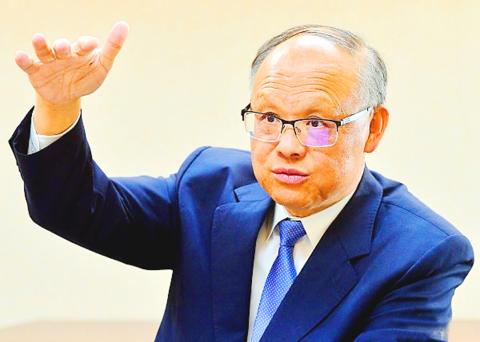Minister Without Portfolio John Deng (鄧振中), head of the Office of Trade Negotiations, on Tuesday said that the government would continue to improve ties with Japan and would not give up on seeking support for its bid to join the Comprehensive and Progressive Agreement for Trans-Pacific Partnership (CPTPP).
Deng made the remarks on the sidelines of a ceremony in Taipei to celebrate Japanese Emperor Akihito’s 85th birthday on Dec. 23, where Japanese Representative to Taiwan Mikio Numata said that despite Tokyo finding the results of the Nov. 24 referendum on a ban on some Japanese food imports “rather regrettable,” it would continue to collaborate with Taipei to create a bright future for both nations.
Numata’s comments represented a minor departure from the response to the referendum of Japanese Minister of Foreign Affairs Taro Kono, who said that the results have rendered Taiwan’s chance of joining the CPTPP unlikely and that Tokyo did not rule out taking the issue to the WTO.

Photo: Wang Yi-sung Taipei Times
The referendum, initiated by the Chinese Nationalist Party (KMT), asked: “Do you agree that the government should, in connection to the March 11 Fukushima Dai-ichi nuclear disaster, continue to enforce the food imports ban on 31 regions in Japan, including agricultural and food products from Fukushima and the surrounding four prefectures and municipalities (Ibaraki, Tochigi, Gunma and Chiba)?”
About 78 percent of the nearly 10 million voters who voted on the question voted “yes.”
Asked how the government now plans to further its CPTP after the referendum, Deng said that the government would not give up its efforts to join the CPTPP and that it would seek to improve its relations with Japan through other means, without elaborating further.
Acknowledging his disappointment with the result, Deng said that the referendum question was clearly leading, as it did not include the terms “radioactive” and “contaminated,” and failed to reflect the truth, which is that there is no way for food products contaminated with radioactivity to enter Taiwan.
“No government in the world would feed their people contaminated food,” Deng said, adding that products imported into the nation need to go through three to four examinations before they are permitted entry.
Deng said that he also has concerns over the attitude of some Taiwanese, whom he said have “taken pleasure” in the problems the referendum result has caused the Democratic Progressive Party administration.
Regardless of their political affiliation, people should refrain from adopting such a triumphal attitude when it comes to international affairs, Deng said, adding that Taiwan should send consistent signals to the international community that it is a supporter of free trade.

US President Donald Trump yesterday announced sweeping "reciprocal tariffs" on US trading partners, including a 32 percent tax on goods from Taiwan that is set to take effect on Wednesday. At a Rose Garden event, Trump declared a 10 percent baseline tax on imports from all countries, with the White House saying it would take effect on Saturday. Countries with larger trade surpluses with the US would face higher duties beginning on Wednesday, including Taiwan (32 percent), China (34 percent), Japan (24 percent), South Korea (25 percent), Vietnam (46 percent) and Thailand (36 percent). Canada and Mexico, the two largest US trading

China's military today said it began joint army, navy and rocket force exercises around Taiwan to "serve as a stern warning and powerful deterrent against Taiwanese independence," calling President William Lai (賴清德) a "parasite." The exercises come after Lai called Beijing a "foreign hostile force" last month. More than 10 Chinese military ships approached close to Taiwan's 24 nautical mile (44.4km) contiguous zone this morning and Taiwan sent its own warships to respond, two senior Taiwanese officials said. Taiwan has not yet detected any live fire by the Chinese military so far, one of the officials said. The drills took place after US Secretary

CHIP EXCEPTION: An official said that an exception for Taiwanese semiconductors would have a limited effect, as most are packaged in third nations before being sold The Executive Yuan yesterday decried US President Donald Trump’s 32 percent tariff on Taiwanese goods announced hours earlier as “unfair,” saying it would lodge a representation with Washington. The Cabinet in a statement described the pledged US tariffs, expected to take effect on Wednesday next week, as “deeply unreasonable” and “highly regrettable.” Cabinet spokeswoman Michelle Lee (李慧芝) said that the government would “lodge a solemn representation” with the US Trade Representative and continue negotiating with Washington to “ensure the interests of our nation and industries.” Trump at a news conference in Washington on Wednesday announced a 10 percent baseline tariff on most goods

THUGGISH BEHAVIOR: Encouraging people to report independence supporters is another intimidation tactic that threatens cross-strait peace, the state department said China setting up an online system for reporting “Taiwanese independence” advocates is an “irresponsible and reprehensible” act, a US government spokesperson said on Friday. “China’s call for private individuals to report on alleged ‘persecution or suppression’ by supposed ‘Taiwan independence henchmen and accomplices’ is irresponsible and reprehensible,” an unnamed US Department of State spokesperson told the Central News Agency in an e-mail. The move is part of Beijing’s “intimidation campaign” against Taiwan and its supporters, and is “threatening free speech around the world, destabilizing the Indo-Pacific region, and deliberately eroding the cross-strait status quo,” the spokesperson said. The Chinese Communist Party’s “threats